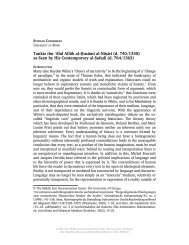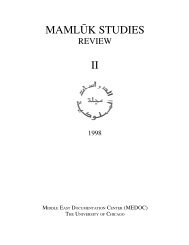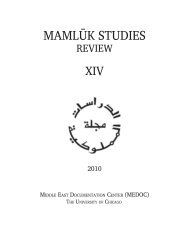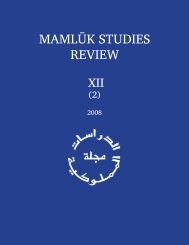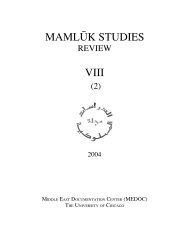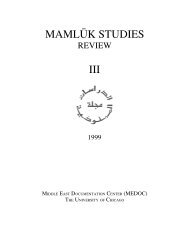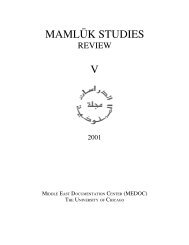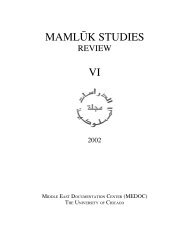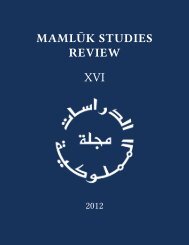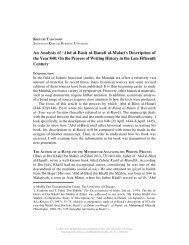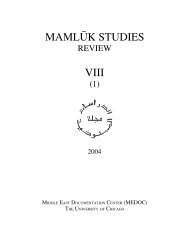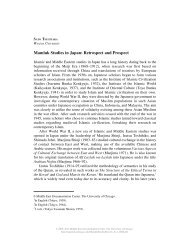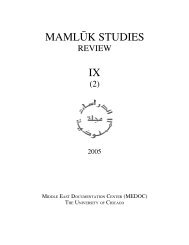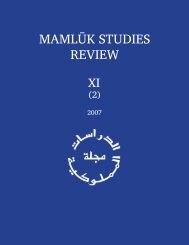Mamluk Studies Review Vol. IV (2000)
Mamluk Studies Review Vol. IV (2000)
Mamluk Studies Review Vol. IV (2000)
Create successful ePaper yourself
Turn your PDF publications into a flip-book with our unique Google optimized e-Paper software.
34 ROBERT IRWIN, UNDER WESTERN EYES<br />
Circassian <strong>Mamluk</strong>s, he was not a pure <strong>Mamluk</strong>ist, for he had other interests and<br />
did major work on the Prophet Isaiah.<br />
Hitherto the primary impetus in <strong>Mamluk</strong> studies had consisted of the amassing,<br />
translating, and editing of material bearing on the <strong>Mamluk</strong>s. Israeli scholars<br />
pioneered a more interpretative approach. Some particularly bold interpretations<br />
of various features of <strong>Mamluk</strong> society were put forward by A. N. Poliak in his<br />
Feudalism in Egypt, Syria, Palestine and Lebanon (1250-1900). This short book<br />
was one of the most determined, but least successful, attempts to present the<br />
<strong>Mamluk</strong>s as chivalrous feudatories. Amirs were "knights," they were "dubbed" by<br />
the sultan or his vice-regent and they held "fiefs." Error crowded upon misjudgment<br />
in Poliak's dense pages. The sultan was elected by an electoral college. 22 The<br />
al-ajna≠d al-qara≠n|s were Caucasian noblemen who had not yet been dubbed<br />
amirs. 23 "The feudal aristocracy" settled their lawsuits according to rules based on<br />
the Great Ya≠sa of Chingiz Khan. 24 Futu≠wah was an order of knights devoted to<br />
Muh˛ammad's posterity. 25 The ruler of the Golden Horde was the suzerain of the<br />
<strong>Mamluk</strong> sultan. 26<br />
Poliak's various articles repeated these errors and disseminated new ones. For<br />
example, in an article on the impact of the Mongol Ya≠sa on the <strong>Mamluk</strong> Sultanate,<br />
Poliak suggested that Mongol immigrants to the <strong>Mamluk</strong> realm enjoyed an especially<br />
high status. Also that "knights" who had never been slaves held themselves to be<br />
superior to <strong>Mamluk</strong>s. Also that the <strong>Mamluk</strong>s' subjects welcomed the Ottoman<br />
invasion, because it meant liberation from the yoke of the Ya≠sa and a return to<br />
‘adl. 27 Much of Poliak's work was carefully dismantled by Ayalon, who observed<br />
that the "late P. had the genius of putting his finger on crucial problems. His<br />
solutions to these problems, however, which were guided more by quick intuition<br />
than by thorough and dispassionate examination of the source material, proved to<br />
be, unfortunately, too often, wide of the mark." 28 Elsewhere Ayalon, writing about<br />
Poliak's erroneous population estimates for the medieval Near East, described him<br />
22<br />
A. N. Poliak, Feudalism in Egypt, Syria, Palestine and Lebanon (1250-1900) (London, 1939), 1.<br />
23<br />
Ibid., 2.<br />
24<br />
Ibid., 14-15.<br />
25<br />
Ibid., 15.<br />
26<br />
Ibid., 16-17 n.<br />
27<br />
Poliak, "The Influence of Chingiz Khan's Yasa upon the General Organization of the <strong>Mamluk</strong><br />
State," Bulletin of the School of Oriental and African <strong>Studies</strong> 10 (1942): 862-76.<br />
28<br />
David Ayalon, "The Great Ya≠sa of Chingiz Khan: A Re-examination; part C1 , The Position of<br />
the Ya≠sa in the <strong>Mamluk</strong> Sultanate," Studia Islamica 36 (1972): 137.<br />
© <strong>2000</strong>, 2012 Middle East Documentation Center, The University of Chicago.<br />
http://mamluk.uchicago.edu/<strong>Mamluk</strong><strong>Studies</strong><strong>Review</strong>_<strong>IV</strong>_<strong>2000</strong>.pdf



